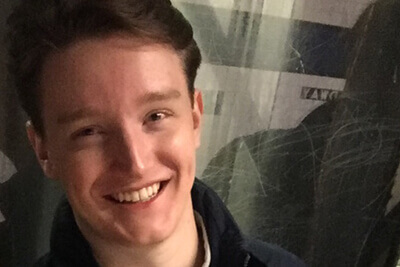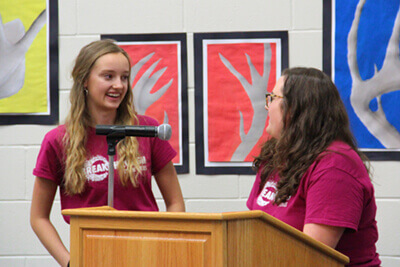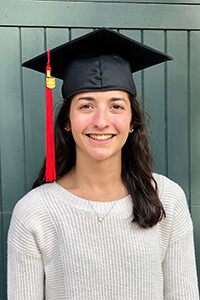May 21, 2020
 MPA is pleased to share that we will be holding an on campus, in-person, outdoor Commencement ceremony for the Class of 2020 on June 6 at 6 PM with appropriate safety measures in place. We will meet and exceed the April 10, 2020 Minnesota Department of Health guidelines on faith-based services in parking lots and the May 8, 2020 State of Minnesota graduation/commencement celebration guidance. By gathering feedback from seniors and their families, we learned that they have a strong desire to gather as a class one last time, albeit in a modified way, and we are happy to be able to honor their requests. MPA has rented a portable stage and the event will be held in the south parking lot, with all attendees remaining in their cars until it is time for the senior to walk across the stage and accept his or her diploma. Sound will be broadcasted to attendees through radio. We ask that only the Class of 2020 and their immediate families attend—to accommodate others, the full Commencement will be recorded and made available to the entire community via Facebook Live. A taskforce of students, faculty, staff, and administrators has been working hard to make it a very special event and we are excited to celebrate the class!
MPA is pleased to share that we will be holding an on campus, in-person, outdoor Commencement ceremony for the Class of 2020 on June 6 at 6 PM with appropriate safety measures in place. We will meet and exceed the April 10, 2020 Minnesota Department of Health guidelines on faith-based services in parking lots and the May 8, 2020 State of Minnesota graduation/commencement celebration guidance. By gathering feedback from seniors and their families, we learned that they have a strong desire to gather as a class one last time, albeit in a modified way, and we are happy to be able to honor their requests. MPA has rented a portable stage and the event will be held in the south parking lot, with all attendees remaining in their cars until it is time for the senior to walk across the stage and accept his or her diploma. Sound will be broadcasted to attendees through radio. We ask that only the Class of 2020 and their immediate families attend—to accommodate others, the full Commencement will be recorded and made available to the entire community via Facebook Live. A taskforce of students, faculty, staff, and administrators has been working hard to make it a very special event and we are excited to celebrate the class!
 As the school year draws to a close in virtually, it is time to begin thinking about how you will return MPA materials to school for inventory and preparation for next year and how your student will receive any projects, work, or remaining personal items that remain at school from before our launch of Virtual School. Yearbooks will also be distributed at this time for those who ordered them. On Thursday, June 11 and Friday, June 12, we will conduct contactless materials pick-up and return at MPA. See below for your family’s pick-up date and time slot.
As the school year draws to a close in virtually, it is time to begin thinking about how you will return MPA materials to school for inventory and preparation for next year and how your student will receive any projects, work, or remaining personal items that remain at school from before our launch of Virtual School. Yearbooks will also be distributed at this time for those who ordered them. On Thursday, June 11 and Friday, June 12, we will conduct contactless materials pick-up and return at MPA. See below for your family’s pick-up date and time slot. Eighth grader Izzy E. has been selected to participate in the Central Zone Diversity Select Swimming Camp sponsored by USA Swimming. Each spring, USA Swimming invites 48 athletes from underrepresented populations to participate in a three-day camp program which includes pool training, motivational and educational sessions, and team-building activities. Selection is based on times swum at USA Swimming sanctioned events. Congratulations Izzy!
Eighth grader Izzy E. has been selected to participate in the Central Zone Diversity Select Swimming Camp sponsored by USA Swimming. Each spring, USA Swimming invites 48 athletes from underrepresented populations to participate in a three-day camp program which includes pool training, motivational and educational sessions, and team-building activities. Selection is based on times swum at USA Swimming sanctioned events. Congratulations Izzy! Meet 2019-20 Alumni Association Board member Nicholas Dugas ’11!
Meet 2019-20 Alumni Association Board member Nicholas Dugas ’11! Literacy Minnesota’s modified Summer Reads program is a great opportunity to help. This year’s Summer Reads VISTAs will support schools and community organizations with a broadened range of initiatives, which may include:
Literacy Minnesota’s modified Summer Reads program is a great opportunity to help. This year’s Summer Reads VISTAs will support schools and community organizations with a broadened range of initiatives, which may include: Are you interested in sharing your story with the MPA Community? MPA Talks is an opportunity to come together, gain perspective and be inspired. We are looking for alumni who will join fellow community members to share impactful stories virtually for our community. If you are interested in speaking for the event or would like to recommend a speaker please contact the Development Office at
Are you interested in sharing your story with the MPA Community? MPA Talks is an opportunity to come together, gain perspective and be inspired. We are looking for alumni who will join fellow community members to share impactful stories virtually for our community. If you are interested in speaking for the event or would like to recommend a speaker please contact the Development Office at  As the 2019–20 school year comes to an end, we’re sharing the college choice stories of the Class of 2020!
As the 2019–20 school year comes to an end, we’re sharing the college choice stories of the Class of 2020! As the 2019–20 school year comes to an end, we’re sharing the college choice stories of the Class of 2020!
As the 2019–20 school year comes to an end, we’re sharing the college choice stories of the Class of 2020! Congratulations to Kian Dahlberg ‘16 on winning the Nishi Luthra Senior Prize, which is awarded to an outstanding senior physics major based on performance in their physics courses at Washington University in St. Louis. Kian is graduating this spring with a double major in physics and statistics, and a minor in computer science. She will be moving to Seattle this summer to begin work as an Environmental Test Engineer for Boeing Space.
Congratulations to Kian Dahlberg ‘16 on winning the Nishi Luthra Senior Prize, which is awarded to an outstanding senior physics major based on performance in their physics courses at Washington University in St. Louis. Kian is graduating this spring with a double major in physics and statistics, and a minor in computer science. She will be moving to Seattle this summer to begin work as an Environmental Test Engineer for Boeing Space.